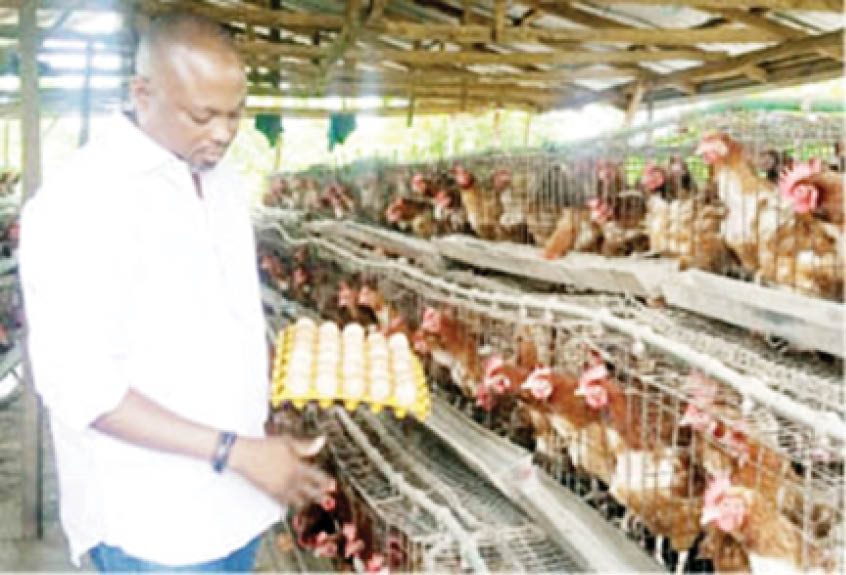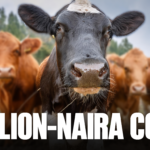Sodunke Olubode Abiodun is the chief executive officer of Simab Farms, a subsidiary of Simab Investment Travel and Tours Limited in Abeokuta, Ogun State. In this interview, the travel agent and large-scale farmer spoke on how the COVID-19 pandemic forced him into farming.
What is the motivation behind this farm?
It all started during the COVID-19 pandemic when we were all at home and my employer, who was part of the aviation sector, was also affected. I looked around for what I could do because I so much believe there is no way you can run away from eating. Once you produce something edible, people will patronise you. That’s how I found myself in farming. I had a little knowledge of it before now, my uncle is a farmer.
BREAKING: Terrorists threaten to abduct Buhari, flog train victims in fresh video
Police rescue 22 kidnapped victims in Niger, foil attempt in Plateau
Did you study anything related to farming?
No. I studied Geography and Regional Planning, and for masters’, it was Transport Management. So, they are not related, but I believe that as a Nigerian, agriculture is part of you. In the university, when we offered General Studies courses, we were given a plot of land where we were expected to cultivate, and others.
Two years down the line, what has been the gain?
When you enjoy what you are doing, when you have passion for it, the profit aspect will be aside. Seeing what one is doing and the result is something for me. When I come around and see the birds eating, I pick their eggs, all these give me joy because I enjoy doing it. There is progress.
How did you start?
We started with 1,000 laying birds, broilers and turkeys. We are already working on the next pen, which is far bigger than this. We only experimented with this starting point to learn and build up, now we have more knowledge to do better.
Apart from the poultry, what else do you do?
We have cassava and yam. We have rabbits, rams, sheep, goats and other things within the farm, and we have plans to expand.
Everything is still in the same area. We attend to poultry twice in a day. We feed and give them water in the morning; they need no attention till around 2pm. In between that period, you can attend to the pig and the fish. But the challenge is the cost of feed, which is very high now, unlike before. We started with a feed that costs about N4,000 for our layers, but right now, it is over N7,000. So capital is a problem. And if you want to go far you put in more to have a balanced profit.
Did you consider the risk involved?
That was why I said you should love what you are doing before the profit. There is a risk for every business. As a businessman you must be a risk taker; if you are considering the risk you will not be able to move. I don’t look at the risk, it is a normal thing; even the life you are living is a risk. Put the risk aspect aside and face the business.
Talking about risk, it is said that most poultry farmers don’t use insurance; how true is it? Are you one of them?
Probably because of the kind of the insurance we practice in Nigeria, it is easier to put in your money but when something comes up, it will be hard to get the money. But by and large, it is best to have insurance; and we are working towards that.
Are you satisfied with the level of Nigerians’ interest in agriculture?
No. We are not exploring up to 20 per cent of what we have in agriculture. We have green grass everywhere. We are not doing well at all, probably because of capital; anything you want to do, you will need money to start. If there is a way to make agriculture appealing to graduates, a lot of them will go back to farm. When I was in the university, I felt like you were looking down on me when you talked to me about farming, whereas there are lots of benefits, especially working for yourself, but the major issue has been capital. We need to give kudos to the banks that have been giving loans. I think they are coming up now.
When you go to developed countries, once they see what you are doing, you can walk into any bank to access funds. This is not applicable in Nigeria; they will need collateral.
How do you sell your products?
We sell them locally. What we have on ground now cannot meet up with our customers’ expectations. The demand is higher than the supply, which is good for any business. You will definitely get a market for poultry products.
Why do you think prices of poultry products, especially eggs, are very high?
Let me use feed as an example. Maize is a major ingredient in all feeds, and farmers can no longer go to farms, unlike before, because of insecurity, and it is really affecting us. When we don’t have many people producing locally, we will source for it from neighbouring countries at a high price. This in turn affects the input and output prices for us. This is why products like eggs are sold at high prices.
Is there any hope that the price of eggs would come down?
Well, as long as they have the materials to reduce the price of feed, the price of eggs will come down. We sell based on what we spend per day.
How many youths have you been able to take off the streets with this farm?
We started with two, and with what we are doing now, we will be taking additional three or four. By the time we add another section, we will have more. We see the workers as a family here.
What is your focus 10 years from now?
I want our farm to be among the first in Ogun State, in fact, Nigeria in general. We want our farm to be notable and a consultant and adviser to the government. We also want to contribute in reducing unemployment in the country as we expand in capacity.
Would you consider COVID as a blessing or curse?
Well, I will say both. If you relent because of what happened you would see problems, but if you see beyond being locked at home you will definitely bring out something from it.
I am in the travels and tourism sector, which was seriously affected during the COVID 19 pandemic. In fact, we are still struggling with it, but because of the same COVID, we brought up this farm. So, the impact of COVID is in two ways.

 Join Daily Trust WhatsApp Community For Quick Access To News and Happenings Around You.
Join Daily Trust WhatsApp Community For Quick Access To News and Happenings Around You.


